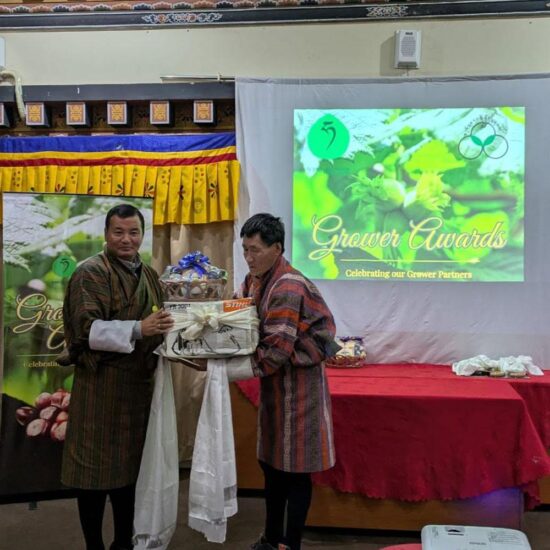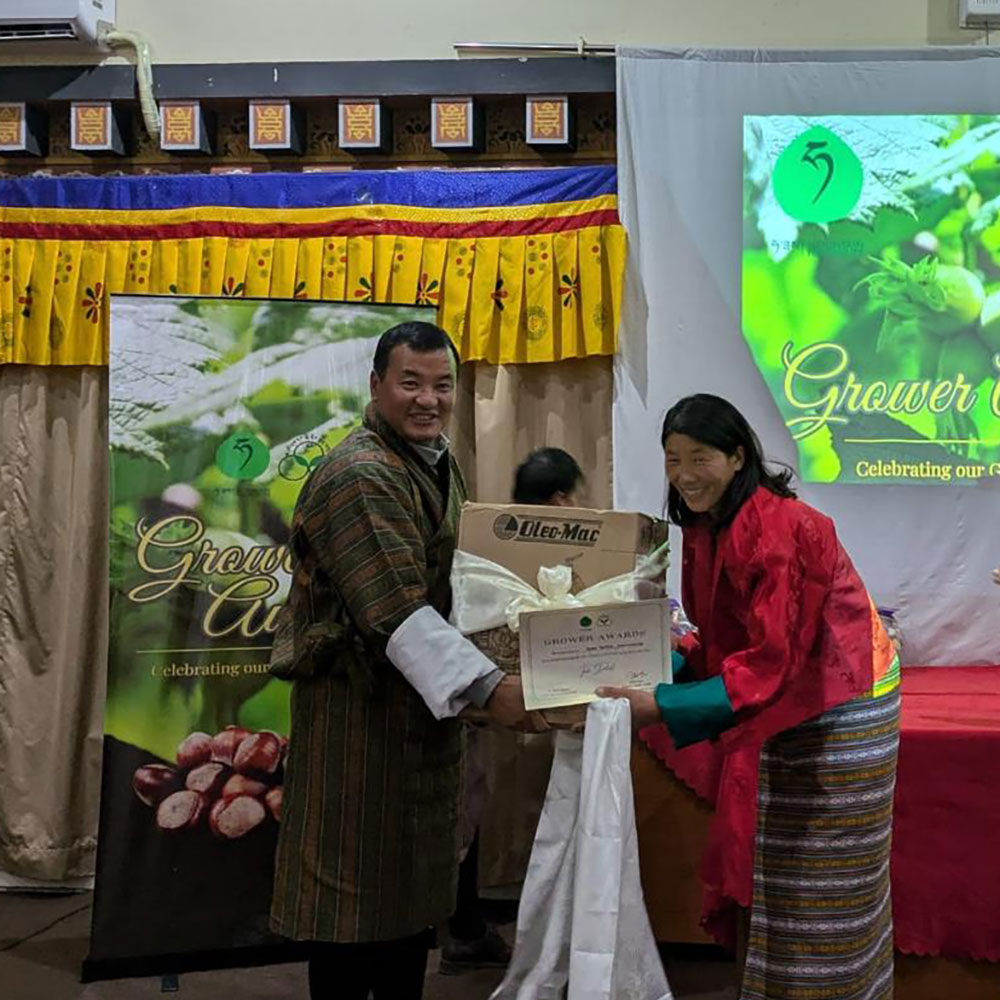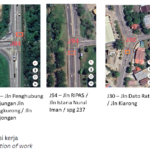༉ སྤྱི་ཟླ་༡ པའི་ཚེས་༧ ལུ་ མོང་སྒར་ལུ་སྦེ་ རྒྱལ་ཁབ་ནང་ ཧ་ཛཱལ་ནཊ་འཛུགས་སྐྱོང་འབད་མི་ཚུ་གིས་ སོ་ནམ་སྡེ་ཚན་ནང་ ལྷན་ཐབས་འབད་བའི་ངོས་འཛིན་ལུ་ ཧ་ཛཱལ་ནཊ་འཛུགས་སྐྱོང་གི་ རྟགས་མ་ལས་རིམ་ཅིག་ འགོ་འདྲེན་འཐབ་ཡོདཔ་ཨིན་པས།
གངས་རི་ཧ་ཛཱལ་ནཊ་དང་ སོ་ནམ་ཚོང་འབྲེལ་དང་ མཉམ་འབྲེལ་ལས་ཁུངས་༢ ཀྱིས་ མཉམ་རུབ་ཐོག་ལས་ འགོ་འདྲེན་འཐབ་མི་ དུས་སྟོན་དེ་ སོ་ནམ་པ་ཚུ་གིས་ ཐོན་སྐྱེད་ཡར་སེང་ལུ་ གྲོགས་རམ་འབད་མི་དང་ ཧ་ཛཱལ་ནཊ་གི་ སྤུས་ཚད་ལེགས་ཤོམ་བཏོན་མི་ དེ་ལས་ རྒྱལ་ཁབ་ནང་ ཧ་ཛཱལ་ནཊི་བཟོ་གྲྭ་ཁང་བཟོ་མི་ལུ་ ངོས་འཛིན་འབད་ཡོདཔ་ཨིན་པས།
གསོལ་རས་ཚུ་ཡང་ ཧ་ཛཱལ་ནཊ་ཤིང་འཛུགས་སྐྱོང་འབད་མི་ གྱངས་ཁའི་ཐོག་ལུ་ གཞི་བཞག་ཐོག་ལས་ ངོས་འཛིན་འབད་ཡོདཔ་ཨིན་པས།
དུས་ཅི་ ཧ་ཛཱལ་ནཊ་དྲག་ཤོས་ཀྱི་ གསོལ་རས་ཐོབ་མི་དེ་ བཀྲིས་གཡང་རྩེ་ལས་ཨིན་མི་ སྐྱེས་ལོ་༤༥ ལང་མི་ སོ་ནམ་པ་བཀྲིས་ལྷ་མོ་ཨིནམ་ད་ མོ་གིས་ དུས་ཅི་གི་ལོ་ནང་ ཧ་ཛཱལ་ནཊ་རྡོག་མ་ཀེ་ཇི་༥༣༧ ཐོན་སྐྱེད་འབད་ཡོདཔ་ཨིན་པས།
གསོལ་རས་འདི་ ང་ལུ་རྐྱངམ་གཅིག་མེན་པར་ ང་བཅས་འཛུགས་སྐྱོང་འབད་མི་ ག་ར་ལུ་ ཧ་ཟཱལ་ནཊ་འཛུགས་སྐྱོང་ཡུན་བརྟན་བཞག་ཐབས་ལུ་ཨིན་ཟེར་ཨིནམ་ད་ ང་བཅས་ག་ར་ མཉམ་རུབ་ཐོག་ལས་ སྤུས་ཚད་ཅན་གྱི་ ཧ་ཛཱལ་ནཊ་ཐོན་སྐྱེད་འབད་ཚུགས་ཟེར་ མོ་གིས་བཤདཔ་ཨིན་པས།
སང་ཕོད་ལས་འབད་བ་ཅིན་ བཀྲིས་ལྷ་མོ་གིས་ ཧ་ཟཱལ་ནཊ་མངམ་འཛུགས་སྐྱོང་འབད་དེ་ ཐོན་སྐྱེད་ཡར་སེང་འབད་ནིའི་ རེ་བ་ཡོདཔ་ད་ ཧེ་མ་འབད་བ་ཅིན་ མི་མང་ཤོས་ཅིག་གིས་ ཧ་ཛཱལ་ནཊ་ཤིང་གིས་ རྡོག་མ་བཏགས་འོང་ག་ཟེར་ དོག་ས་པ་ཆགས་ཡོདཔ་ད་ ཨིན་རུང་ ད་རེས་ནངས་པར་འབདཝ་ད་ མང་ཤོས་ཅིག་གིས་ རྡོག་མ་བཏོག་ནི་ཡང་ འགོ་བཙུགས་ནུག་ཟེར་ཨིན་པས།
གསོལ་རས་ཨང་གཉིས་པ་དེ་ ལྷུན་རྩེ་ སྨད་ཚོ་རྒེད་འོག་ལས་ཨིན་མི་ སྐྱེས་ལོ་༧༣ ལང་མི་ ཀརྨ་ཨིནམ་ད་ ཁོ་གིས་ ཧ་ཛཱལ་ནཊ་རྡོག་མ་ ཀེ་ཇི་༣༩༤ ཐོན་སྐྱེད་འབད་ཡོདཔ་ཨིན་པས།
ཧ་ཛཱལ་ནཊ་ཤིང་ འཛུགས་སྐྱོང་འབད་བའི་སྐབས་སུ་ གདོང་ལེན་ལེ་ཤ་ཅིག་ར་འདུག་ཟེར་ཨིན་རུང་ འཛིན་སྐྱོང་འཐབ་ནི་དང་ བསྒུགས་སྡོད་ནི་དེ་ གཙོ་བོ་ཅིག་ཨིན་མས་ཟེར་ཨིནམ་བཞིན་དུ་ ད་རེས་ གསོལ་རས་ཐོབ་མི་གིས་ ད་ལས་ཕར་འབད་རུང་ ལཱ་རྩ་འགེངས་འབད་ནི་ལུ་ སེམས་ཤུགས་ཐེབས་ཐོབ་ཅི་ཟེར་ ཀརྨ་གིས་ བཤདཔ་ཨིན་པས།
ཀརྨ་གིས་ ཁོ་རའི་ས་ཆ་ལྷག་ལུས་ཨེ་ཀར་༨ ཡོད་མི་ནང་ ཧ་ཛཱལ་ནཊ་ཤིང་འཛུགས་སྐྱོང་འབད་ནིའི་ འཆར་གཞི་ཡོདཔ་ད་ ཆ་རོགས་ཚུ་ལུ་ཡང་ ཧ་ཟཱལ་ནཊ་ཤིང་འཛུགས་སྐྱོང་འབད་བཅུག་ནི་ལུ་ སེམས་ཤུགས་བསྐྱེད་བཅུག་ནི་ ཨིན་མི་དེ་ཡང་ ཚོང་འབྲེལ་གྱི་དཀའ་ངལ་མིན་འདུག་ཟེར་ཨིནམ་ད་ ང་བཅས་ཀྱིས་ ག་དེ་མང་མང་ ཐོན་སྐྱེད་འབད་དགོ་པས་ཟེར་ཨིན་པས།
བུམ་ཐང་སྟང་རྒེད་འོག་ལས་ སྐྱེས་ལོ་༥༡ ལང་མི་ བཀྲིས་ནོར་བུ་གིས་ ཧ་ཛཱལ་ནཊ་ཀེ་ཇི་༢༢༧ ཐོན་སྐྱེད་འབད་མི་ལུ་བརྟེན་ ཨང་༣ པའི་ གསོལ་རས་ཐོབ་ཡོདཔ་ཨིན་པས།
སོ་ནམ་པ་ཚུ་གིས་ ལོ་ཐོག་ཐོན་སྐྱེད་འབད་ནི་ རྐྱངམ་གཅིག་མེན་པར་ མི་སྡེ་ནང་ཡང་ ཡར་ཐོན་འབདཝ་ཨིན་ཟེར་ཨིནམ་ད་ ང་ར་ གསོལ་རས་ཐོབ་མི་ལུ་ སེམས་དགའ་ཡོདཔ་མ་ཚད་ ད་རུང་ འཕྲོ་མཐུད་དེ་ར་ ལཱ་རྩ་འགེངས་འབད་དེ་ རང་འཚོ་རང་ལྡང་བཟོ་ནི་ལུ་ གཙོ་བོར་བཏོན་ནི་ཟེར་ཨིན་པས།
དུས་སྟོན་གྱི་སྐབས་ལུ་ མའུ་ཊེན་ ཧ་ཛཱལ་ནཊ་ཤིང་ འཛུགས་སྐྱོང་འབད་མི་ དྲག་ཤོས་༡༣ ངོས་འཛིན་འབད་ཡོདཔ་ཨིན་པས།
ཧ་ཛཱལ་ནཊ་གི་ གྲོས་སྟོན་འགོ་དཔོན་ ཀུན་ལེགས་ཚེ་རིང་གིས་ སོ་ནམ་པ་ཚུ་ལུ་ ཁས་བླངས་དང་ བསྟོད་བསྔགས་ཚུ་འབད་ཡོདཔ་ད་ གངས་རི་ཧ་ཟཱལ་ནཊ་ཤིང་ འཛུགས་སྐྱོང་འབད་མི་ཚུ་གིས་ ལས་སྡེ་ལུ་ཁེ་ཕན་བྱུངམ་མ་ཚད་ དཔལ་འབྱོར་ལུ་ཡང་ ཕན་ཐོགས་བྱུང་སྟེ་ཡོད་ཟེར་ཨིནམ་ད་ ང་བཅས་ཀྱིས་ སྤུས་ཚད་ལེགས་ལྡན་བཟོ་ཐོག་ལས་ འཛམ་གླིང་གི་ཚོང་འབྲེལ་ནང་ ཚོང་འབྲེལ་འཐབ་ནི་ཨིན་ཟེར་ཨིན་པས།
རྫོང་ཁག་༡༩ ནང་ ས་ཆ་ཨེ་ཀར་༤,༧༨༠ ནང་ ཁྱིམ་གུང་༨,༢༩༨ གིས་ ཧ་ཛཱལ་ནཊ་ཤིང་འཛུགས་སྐྱོང་འབད་ཡོདཔ་ཨིན་པས།
ན་ཧིང་གི་ལོ་ལུ་ ཧ་ཛཱལ་ནཊ་མེ་ཊིག་ཊཱོན་༡༠.༤ ཐོན་སྐྱེད་འབད་མི་གིས་ སྤྱི་ལོ་༢༠༢༣ དང་ཕྱདཔ་ད་ མེ་ཊིག་ཊཱོན་༥.༥ ཐེབས་ཐོན་སྐྱེད་འབད་ཡོདཔ་ཨིན་པས།
ན་ཧིང་གི་ལོ་ལུ་ ཧ་ཛཱལ་ནཊ་ཐོན་སྐྱེད་ལུ་བརྟེན་ ཡུ་ཨེསི་ཌི་༡༠,༠༠༠ ཐོབ་ཡོདཔ་ལས་ འབྲུག་ལས་སོ་ནམ་གྱི་ ཚོང་འབྲེལ་ཕྱིར་ཚོང་ནང་ དྲག་ཤོས་ཀྱི་གྲངས་སུ་ ཚུད་ཡོདཔ་ཨིན་པས།
ཧ་ཛཱལ་ནཊ་ལས་སྡེ་གིས་ དུས་ཅི་ལས་ ཧ་ཛཱལ་ནཊ་རྡོག་མ་ཀེ་ཇི་རེ་ལུ་ གོང་ཚད་དངུལ་ཀྲམ་༡༥༠ ལུ་ ཡར་སེང་འབད་མི་གིས་ སོ་ནམ་པ་ཚུ་ལུ་ ཕན་ཐོགས་འབྱུང་ནི་དང་ ཚོང་འབྲེལ་འཐབ་ནི་ལུ་ སེམས་ཤུགས་བསྐྱེད་བཅུག་ཐབས་ལུ་ཨིན་པས།
ལས་སྡེ་གིས་ ཚོང་འབྲེལ་དེ་ གཞན་དང་གཞན་ཡང་ ཨཱསི་ཊེ་ལི་ཡ་དང་ སིངྒ་པུར་ དེ་ལས་ རྒྱ་གར་རྒྱལ་ཁབ་ཚུ་ནང་ ཁྱབ་སྤེལ་འབད་དོ་ཡོདཔ་ཨིན་པའི་གནས་ཚུལ།
ཚེ་རིང་དབང་འདུས།













